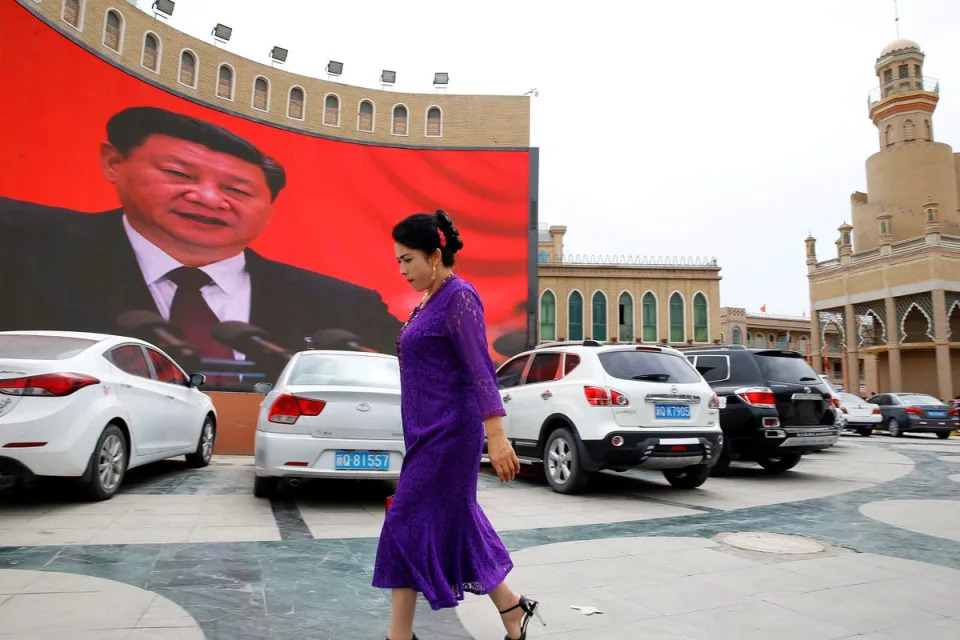Signs of Another Secret ‘Shadow Army’ Left Behind by Prigozhin
Shannon Vavra
Tue, 29 August 2023

Photo Illustration by Elizabeth Brockway/The Daily Beast/Getty
After Yevgeny Prigozhin staged his failed revolt in Russia two months ago, the Kremlin promptly clamped down on his empire. The paramilitary boss and his mercenaries were exiled to Belarus, while Wagner-linked media companies that spewed Russian propaganda online were blocked. The future of his information operations were further put into question last week, when Prigozhin was reported dead in a plane crash that bore all the signs of an assassination ordered by President Vladimir Putin.
But despite the clampdown on Wagner’s propaganda minions and the apparent death of the mercenary boss, signs are emerging that Prigozhin’s information operations network never really went away.
A couple of hundred Russian-language accounts pushing pro-Russia and pro-Putin narratives sprung up early this month on Twitter, or X, before Prigozhin’s reported death, according to Clemson University research shared exclusively with The Daily Beast.
The network of accounts—which followed each other and interacted with similar posts that amplify Kremlin lines—has all the telltale signs of a Prigozhin op, according to Darren Linvill, who has been researching Russian information operations for years.
Linvill began researching Russian troll army operations in 2017, surfacing 3 million tweets from Russian trolls in research that drew the attention of law enforcement agencies and U.S. Army Cyber Command.
How Prigozhin Could Wreak Havoc From Beyond the Grave
“Whatever the IRA is now, it’s definitely operated by the same people sitting at the same desks regardless of the name you put on their employer. But the troll operations are still ongoing,” Linvill said of the network, adding that many of the accounts were taken down after he reported them to Twitter, or X.
Twitter did not respond with a substantive comment on the matter. The auto-reply from the press office indicated Twitter would reply.
But parts of the network, or at least accounts linked to the troll network, appear to remain online and active, according to posts, accounts, and other activity reviewed by The Daily Beast.
The accounts, which were created this month and which keep popping up even as others get shot down, focus on promoting pro-Putin and pro-Russia narratives. Most follow the same pattern: They use generic profile pictures, shoot off a few tweets in an apparent effort to look legitimate, and then get to work on their influence operation in the replies and likes.
The accounts appear to be pushing the same kind of pro-Kremlin narratives across the board, using a similar tone. That includes defending Russian air defense capabilities (which have suffered in recent weeks) and Putin’s reputation (which has sunk lower than ever before on the world stage since the illegal invasion of Ukraine last year) as well as spreading disinformation designed to break Ukrainian morale.
One account in the network that still remains online—a user that goes by the name “Gleb”—spewed out over a dozen insults and pro-Moscow commentary on Twitter in just over 10 minutes on Thursday.
The user weighed in on the news that an exiled political activist, Maxim Katz, was sentenced in absentia for criticizing Russia’s war in Ukraine, adding: “Katz, you are a criminal, we are waiting for you in Russia, you will be met right at the door of the plane as an honored guest.”
The user also tweeted out an insult at Putin rival Alexei Navalny, and commented several times about the speculation surrounding the apparent death of Prigozhin, backing up the Kremlin’s claims about the mercenary boss.
Some posts appear coordinated between accounts in the network. Gleb follows another user who goes by the name “Maria” and they both posted comments around the same time Thursday urging other users to not worry about new countries joining BRICS—a club of emerging nations including Brazil, Russia, India, China, and South Africa.
“Calm down,” Gleb said.
The Maria account also posts praise for Putin and commentary about geopolitics that aligns with Russia’s world view, complaining about the West’s focus on a unipolar world.
“Putin is an experienced politician and people in Russia appreciate him,” the Maria account said Thursday.
Several of the accounts echo Kremlin propaganda about the war in Ukraine. Maria accuses the West of killing Ukrainians by providing them weapons to fight off Russian forces. Another account that goes by “Ekaterina” posted narratives meant to discourage Ukraine in the war, suggesting more Western aid wasn’t coming and applauding the quality of Russian equipment. Another user, “Anastasia,” posts in support of the Russian invasion as well.
From Murder Pigeons to ‘Evil’ Forces: How Putin Sold His War
The network’s pro-Putin leanings align with a switch Linvill had seen in Russian troll networks earlier this year. Linvill said that just after Prigozhin’s revolt, when it appeared Moscow began to absorb some of Prigozhin’s media assets, the trolls switched from supporting Prigozhin to propping up Putin.
While it’s not 100 percent clear that the accounts created this month are run and operated by the people who previously worked for Prigozhin’s troll farms, it has all the telltale signs of the same operation, Linvill explained.
It seems unlikely that Putin will give up the sweeping influence arm that Prigozhin built up through the years—even after the Wagner boss’s death, according to some analysts. With the war in Ukraine faltering and the very public way his authority has been challenged in recent months, the Russian president might be in dire need of a strong propaganda arm.
“Frankly, propaganda is more important to Putin now than it’s ever been. He’d be a fool to dismantle the apparatus that has helped keep him in place,” Linvill said.
Orders From Above
The rapid succession of pro-Russia posts on the same topics suggests that the troll network is handed a list of topics to post about—including specific guidance on what narrative spin to use, Roman Osadchuk, an Atlantic Council digital research associate focused on Eurasia in Kyiv, told The Daily Beast.
“A real person needs at least some time to read the first tweet and then reply. This, they’re publishing a few times within a minute or two sometimes. It is possible… but if they are replying to different Twitter threads, they need to find those threads,” Osadchuk told The Daily Beast. It “looks like they have a list of topics that they need to comment on.”
The speedy and coordinated overlap from the accounts’ activity at times suggests that either different people are operating the accounts manually with the same tasking, or someone is running the accounts using some kind of automation and scripts.
“Somebody had to write those comments in advance so the script could write them,” Osadchuk said.
The Secret Russian ‘School’ Churning Out Minions for Putin
The accounts’ handles’ construction—with last name first, followed by the first five letters of a first name—is another indicator that the network is not made up of authentic users. It suggests the network used an algorithm or software to create the accounts and check for combinations of names that weren’t already claimed on the platform, Osadchuk said.
There is likely “an algorithm that has different writings of specific names, different variants, and then it plays with whether this name is being already used on the platform or not and changes it and tries different combinations,” Osadchuk said.
The accounts appear to make little to no effort to build realistic personas on their profiles. One account examined by The Daily Beast, for example, sports a generic profile picture lifted from popular memes online. The account sports a “swole Doge,” a dog head with an extremely muscular body, for instance. Two accounts appear to both use the same image of a cat as their profile picture in a likely sloppy and quick effort to set up the accounts.
Chiming in
The network also chimes in on breaking news, even if it’s potentially controversial for Putin.
On several occasions, Anastasia and Maria both accused the West of killing off Prigozhin, although many U.S. officials have suggested that Putin would likely have targeted the mercenary boss after his rebellion in Russia. On Friday, several accounts posted lines about how the investigation into his death is ongoing, encouraging trust in the Russian process.
The reach of the operation doesn’t appear to be tremendous by any means yet. The Gleb account, for instance, has just six followers, and is only following 21 accounts, many of which are Russian news outlets. Many of the other accounts in the network exhibit a similar low following.
According to Linvill, that’s another indication that the network is indeed the work of a Russian troll farm. As Russian troll farms have gotten caught in the act more and more in recent years, they have switched from running well-developed and creative accounts that fly under the radar, to low-level accounts that simply jump in where the conversation is ongoing already.
“They’re not driving narratives, they’re responding,” Linvill said. “That’s something you can do without a following and it’s something you can do even if you know your account might get suspended and still have an impact on the platform.”













